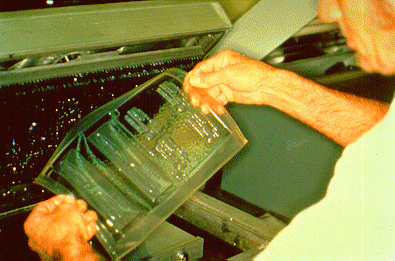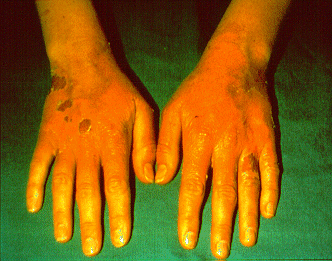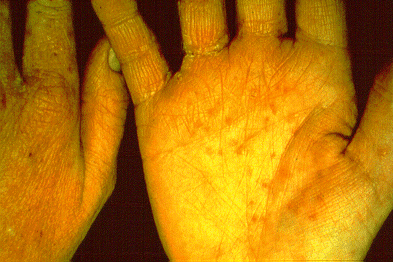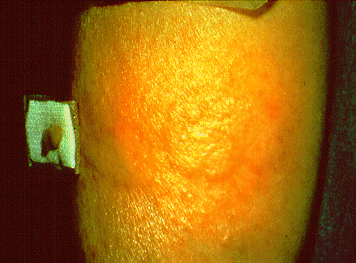Occupational Dermatoses
NOTE: This page is archived for historical purposes and is no longer being maintained or updated.
Slides 51 to 55
Slide 51 - Ultraviolet cured processes

The technology of using ultraviolet light sensitive chemicals is relatively new in creating templates for printing. It is also being used in the manufacture of certain printing inks and in dentistry. Various acrylates have been the sensitizers in this process.
Slide 52 - Photosensitivity

Many chemicals need light to activate and produce the complete phototoxin or photoallergen. The furocoumarins in limes produced this vesicular phototoxic dermatitis in a bartender who squeezed limes all afternoon in direct sun.
Slide 53 - Contact urticaria - Latex Rubber

Contact urticaria is an important manifestation of natural rubber latex allergy. Workers exposed to latex gloves and other products containing natural rubber latex may develop allergic reactions such as skin rashes; hives (contact urticaria); nasal eye or sinus symptoms; asthma; and (rarely) shock.
Slide 54 - Contact urticaria - Raw Fish

A person who developed immediate clinical contact urticaria demonstrates a positive provocative open epicutaneous patch test to fish. The observation time to read the test is shortly after application, as opposed to the two to four day interval between testing and reading in delayed hypersensitivity contact dermatitis.
Slide 55 - Tar and sunlight hyperpigmentation
This photo was removed due to privacy concerns.
Chronic exposure to tar and sunlight caused the marked hyperpigmentation in this Caucasian pipeline worker. The occupational photosensitizing chemicals most well the action spectrum lies in the long wave ultraviolet and visible light. Such derivatives include anthracene, phenanthrene, creosote and certain dyes. Coal tar products are used in roofing, pipeline and road construction, wood preservation and may other processes.
- Page last reviewed: January 5, 1998 (archived document)
- Content source:
- National Institute for Occupational Safety and Health Health Effects Laboratory Division (HELD)


 ShareCompartir
ShareCompartir